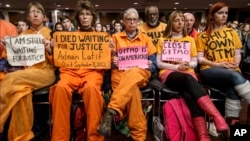Proof that the U.S. detention facility at Guantanamo Bay, Cuba, inspires and rallies the world’s most savage terrorists has flashed across television screens around the world in recent weeks, a deputy undersecretary of defense said Thursday.
“It is no coincidence that recent ISIS [Islamic State] videos showing the barbaric burning of a Jordanian pilot and the savage execution of a Japanese hostage each showed the victims clothed in an orange jumpsuit, believed by many to be the symbol of the Guantanamo Bay detention facility,” Undersecretary Brian McKeon told the Senate Armed Services Committee.
President Barack Obama has long-advocated closing the Guantanamo facility, which was established to hold terror suspects after the attacks of September 11, 2001. Obama has argued that the prison constitutes a blemish on the United States' reputation that complicates relations with allies and partners and helps terrorist groups recruit new fighters.
For independent Senator Angus King of Maine, at issue are costs and benefits.
“Is it more dangerous for the national interest to keep Guantanamo open because of its use as a recruiting tool, or is there a greater risk of the people being released re-engaging?” he asked.
King was referring to Pentagon reports that nearly 30 percent of more than 600 detainees released from Guantanamo have either resumed combatant activities or are suspected of having done so. The Obama administration maintains the recidivism rate has declined to less than 10 percent in recent years, something that is of little comfort to freshman Republican Senator Tom Cotton of Arkansas, an Iraq War veteran.
“In my opinion, the only problem with Guantanamo Bay is there are too many empty beds and cells there," he said. "We should be sending more terrorists there for further interrogation to keep this country safe. As far as I am concerned, every last one of them can rot in hell.”
The detention camp’s population has declined from nearly 800 more than a decade ago to just more than 100, of which nearly half are scheduled for release. The administration has said that no further detainees will be sent there, so the question becomes what to do with the last several dozen who remain. U.S. law currently prevents transferring Guantanamo detainees to the United States for trial.
Congress should at least consider changing that law, according to Democratic Senator Joe Manchin of West Virginia, who notes the cost per detainee at Guantanamo Bay exceeds $3 million a year, compared with less than $100,000 at a U.S. maximum security prison.
“Three million dollars per [Guantanamo] detainee, and $80,000 for the hardened prisoners we have [in the U.S.]. We have nobody escaping from [high-security prisons in] America,” he said.
Far from allowing Guantanamo prisoners on U.S. soil, the Armed Services Committee is considering a bill that would freeze all releases from Guantanamo for two years. At the hearing, administration officials argued strongly against the proposal.
The committee’s chairman, Republican Senator John McCain of Arizona, expressed frustration with the administration, noting Obama has had six years to send Congress a comprehensive plan on the future of the Guantanamo Bay detention facility.












